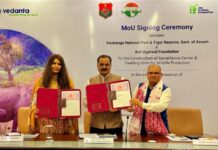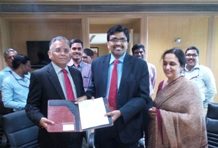New Delhi, May 08, 2014: Shri Ajit Seth, Cabinet Secretary, Government of India today said that the Indian industry has an important role to play in developing standards in India. Shri Seth was delivering the inaugural address at the “Standards Conclave: Role of Standards in International Trade: Challenges Opportunities and Issues” organized by the Ministry of Commerce and Industry and Confederation of Indian Industry here today.
Shri Seth observed that India does not have a standard driven culture and India’s manufacturing sector has been accustomed to developing in an environment where standards have been lax. He called for appropriate legislation to be put in place to provide an instrument to notify standards.
He observed that internationally the role of standards had gained importance with the adoption of SPS and TBT Agreements during the Uruguay Round of WTO. He felt that India needs to take a leading role in the identification and development of standards. This will help improve the competitiveness of Indian industry and help it to improve its export prospects.
In his address, Shri Rajeev Kher, Commerce Secretary, Department of Commerce, Government of India stated that standards had effectively replaced tariffs in the international trade discourse. He stated that development of rules had gained greater importance than tariffs. Countries around the world are developing higher standards and are designing products to meet these standards. He felt that the time had come for Indian industry to do the same.
Elaborating further, Shri Kher highlighted how different countries in Africa had upgraded their standards for various products and many of these were now at par with developed country standards. He felt that Indian industry may find itself shut out of some of these markets if it does not enhance its quality.
The Commerce Secretary also spoke of the enclavisation of international trade with the creation of mega trading blocs like the Trans Pacific Partnership (TPP), the Trans Atlantic Trade and Investment Partnership (TTIP) and the Regional Comprehensive Economic Partnership (RCEP) was leading to a paradigm shift in the trade regime. The emphasis had moved away from tariffs and these blocs would now be focused on creation of rules, regulations and standards. He felt that India needs to find a place in this new architecture.
Shri Kher was of the view that government and industry needed to be on the same page in terms of development of standards. He felt that a comprehensive law needed to be formulated under which standards development could take place. He observed that there was a need to mainstream the acceptance of standards even within the Government of India and a consultative mechanism needed to be put in place to bring all stakeholders together while formulating standards.
In his address Mr. Sunil Soni, Director General, Bureau of Indian Standards stated that India needed to greater advantage of the SPS and TBT agreements under the WTO. Of the 18,000 notifications issued under these agreements from various countries, regulations issued from India numbered only 93. Even these few were the topic of intense debate. This pointed to the need to put in place a sound regulatory environment in the country.
Mr. Soni observed that while the BIS is the apex organization for the formulation of standards in India, there were other organisations involved in this process as well. He felt that there was a need to develop synergy between the BIS and these organisations.
In his opening remarks, Mr. Deep Kapuria, Chairman, CII MSME Council and Chairman, Hi-Tech Group stressed on the need to make compliance with standards affordable. He felt that the high cost of compliance may lead to a large number of MSME’s not being able to export their products.
Mr. Chandrajit Banerjee, Director General, CII in his welcome address stated that the enhancement of standards would not only boost India’s exports but also would restrict inferior imports which are causing serious injury to the domestic industry. CCI Newswire






























